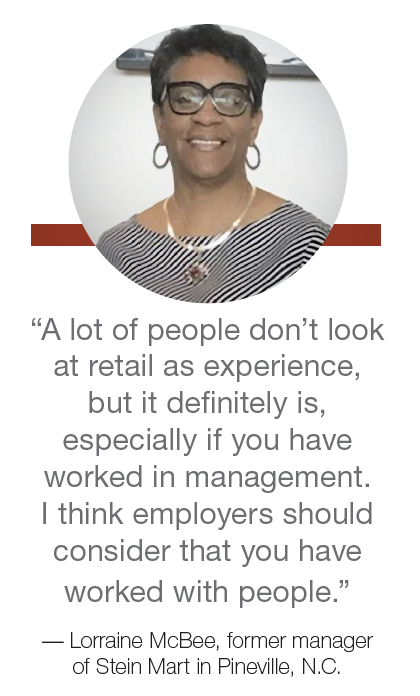
By Sonja Whitemon
The retail industry has been a dominant source of employment in the U.S. for decades, employing more people than the airline, banking or hotel industries. But retail has been on the decline for years, long before Covid-19 came on the scene. The convenience of online shopping and self-checkouts have contributed to a consistent erosion in retail jobs.
For 15 years or more, we have seen familiar brands permanently shuttered including Linens and Things, Toys R Us and Circuit City. Casual Corner, Sports Authority, The Limited and Payless Shoes all have closed their storefronts. Though still in business, retail giants like Sears and Kmart are just a shadow of their former selves. These retailers have closed more than 3,500 stores and cut about 250,000 jobs in the past 15 years. The fate of JCPenney, now in bankruptcy, has been in question for nearly 20 years and local icon Belk recently filed for Chapter 11 bankruptcy, saving it from liquidation for now. Had the brand gone under, nearly 22,000 workers would have lost their jobs.
These store closing announcements come and go. The stores are here and then they are gone and are mostly forgotten, but when you consider the total impact on employment and the industry as a whole, this is no small matter. Behind every store that closes, there are people who have lost their incomes. While America mourns the loss of 8,000 coal mining jobs last year, nearly 400,000 jobs were lost in retail, according to MSNBC. Some analysts believe many of these jobs may never come back. Despite the decades long decline, nothing has impacted the industry like Covid-19.
While all jobs are important, retail is one of the most important employment sectors in the country for a number of reasons. Retail jobs were in abundance. Even during the later declining years, before Covid 19, there were always jobs available and on-the- job training made it a great source of employment for those who needed employment quickly and those with little work experience. Retail also offers flexible hours, evenings and weekends, popular with students and those needing a second source of income.
So, what happens to retail workers when these stores go out of business? CareerFlex is a company that specializes in helping retail employees left behind after store closures. According to Dominick Keefe, founder of CareerFlex, laid-off retail workers often go into other retail jobs.
“Despite job market constraints imposed by Covid, most CareerFlex job seekers have found success transitioning from one retailer to another while those that don’t, switch industries altogether,” said Keefe.
In fact, some sectors of the retail industry are still doing well. Home improvement stores and grocery stores, for example, are thriving and hiring amid the Coronavirus outbreak. Burlington, formerly Burlington Coat Factory, announced this year plans to expand its store count from 1,000 to 2,000.
Lorraine McBee agrees. A 27-year veteran of retail management, she was most recently the manager of Stein Mart in Pineville, North Carolina, until the store closed in October, leaving about 40 employees out of work.
According to McBee, some employees have found other retail jobs, but for those interested in moving into other lines of work, she points out that many skills used in retail are skills used in every business therefore should be transferrable to other industries.
“A lot of people don’t look at retail as experience, but it definitely is, especially if you have worked in management. I think employers should consider that you have worked with people,” McBee said. “There are people who have left and totally changed careers. The people that I’ve talked to have also gone into different things like banking and finance and teaching.”
As retail is declining, the call center business is exploding. There are more than 100 companies that hire for call center work in Charlotte. These companies are in banking, insurance, retail chains, health care and more. Like retail, call centers also provide on-the job-training. They often pay slightly more than store-based retail jobs.
Other careers where retail skills might be valuable are bank teller, real estate agent and insurance agent. In real estate and insurance there are other support positions that could be available as well. Other positions that might be of interest include dental hygienist, registered nurse, massage therapist, HVAC technician, cosmetology and phlebotomy technician. Most of these careers require some advanced training.
CareerFlex recommends those who are facing layoff in retail, make a plan. Career Flex Vice President, Alex McKeown encourages job seekers to “be intentional with your efforts.” He recommends that applicants customize their application for the job. “Read the job description carefully, understand what the [employer] is looking for and tailor your application to fit that description,” McKeown said. “It may take more time to apply to each job, but it will pay dividends and help you stand out from the crowd.”

